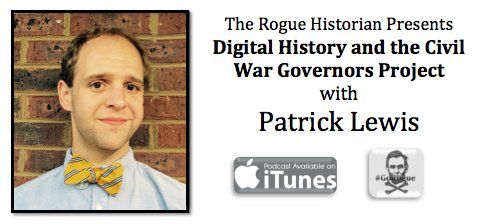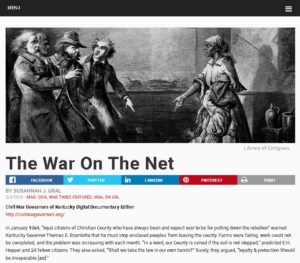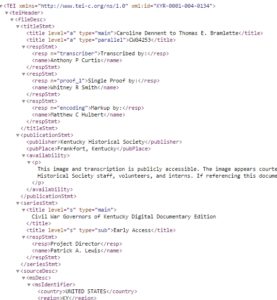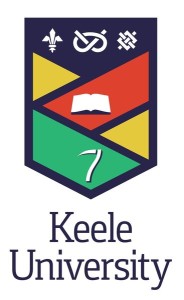Overview
The Kentucky Historical Society seeks eight Graduate Research Associates (GRAs) familiar with 19th century United States history to write short informational entries for the Civil War Governors of Kentucky Digital Documentary Edition (CWG-K). GRAs will receive a stipend of $5,000 each and can work remotely from their home institutions.
Each GRA will annotate 150 assigned documents each. Each GRA must be a graduate student in at least the second year of a M.A. program in history or a related humanities discipline. In accordance with its commitment to facilitating relationships between history practitioners and organizations in Kentucky and nationally, KHS hopes that these GRA positions will help advance the professional skills of early-career historians in Kentucky and elsewhere. Preference will be given to candidates who are enrolled in graduate programs in history at Kentucky universities, though applicants worldwide are encouraged to apply. These positions are funded by a grant from the National Historical Publications and Records Commission (NHPRC), a branch of the National Archives.
CWG-K is an annotated, searchable, and freely-accessible online edition of documents associated with the chief executives of the commonwealth, 1860-1865. Yet CWG-K is not solely about the five governors; it is about reconstructing the lost lives and voices of tens of thousands of Kentuckians who interacted with the office of the governor during the war years. CWG-K will identify, research, and link together every person, place, and organization found in its documents. This web of hundreds of thousands of networked nodes will dramatically expand the number of actors in Kentucky and U.S. history, show scholars new patterns and hidden relationships, and recognize the humanity and agency of historically marginalized people. To see the project’s work to date, visit discovery.civilwargovernors.org.
Scope of Work
Each GRA will be responsible for researching and writing short entries on named persons, places, organizations, and geographical features in 150 documents. Each document contains an average of fifteen such entities. This work will be completed and submitted to CWG-K for fact-checking before June 30, 2017.
Research and writing will proceed according to project guidelines concerning research sources and methods, editorial information desired, and adherence house style. This will ensure 1) that due diligence is done to the research of each entity and 2) that information is recorded for each item in uniform ways which are easy to encode and search.
All research for the entries must be based in primary or credible secondary sources, and each GRA is expected to keep a virtual research file with notes and digital images of documents related to each entry. These will be turned over to CWG-K at the completion of the work. CWG-K will fact-check all entries for research quality and adherence to house style. CWG-K projects an average rate of one document annotated per two hours of work. Each GRA may expect to devote approximately 300 hours to the research—though the actual investment of time may vary.
Each GRA will work remotely. Interaction with the documents and the writing of annotations will take place in a web-based annotation tool developed for CWG-K, which can be dialed into from any location. CWG-K will make use of online research databases to make its work efficient and uniform. Other archival sources may be of value but are not required by the research guidelines. Securing access to the paid databases required by CWG-K (Ancestry.com, Fold3.com, and ProQuest Historical Newspapers: Louisville Courier Journal) is the responsibility of the GRA. If regular institutional access to these databases is not available to the GRA through a university or library, it is the responsibility of the GRA to purchase and use a subscription to these databases. KHS will not reimburse the GRA for any travel, copying, or other expenses incurred in CWG-K research.
In order to maintain quality and consistency as well as to foster a collegial and collaborative work culture, CWG-K will conduct weekly virtual “office hours” via Google Hangouts, during which GRAs are required to dial in, ask questions of staff, share expertise and research methods, and make connections with their peers at other universities. Virtual attendance at these office hours is mandatory, and multiple sessions may be offered to accommodate schedules.
The Kentucky Historical Society will hold copyright for all annotation research as work for hire.
Evaluation Criteria
A proposal should consist of at least a narrative statement of professional ability in the form of a cover letter, a CV, and two letters of recommendation. Additional supplementary materials that demonstrate capacity in the evaluation factors may also be included. Applications are due by September 16, 2016 to Tony Curtis, tony.curtis@ky.gov.
The Kentucky Historical Society will evaluate the proposals based on the following factors:
Research Experience (70 points): Describe your familiarity with research in 19th century U.S. history. Describe some projects you have undertaken. What sources have you used? Have you been published? Have you interpreted historical research in forms other than a scholarly peer-reviewed publication? How does the proposed research project differ from those you have undertaken in the past? Describe your familiarity with the strengths and weaknesses of online research databases such as Ancestry.com, Fold3.com, ProQuest, and Google Books.
Project Experience (30 points): Describe any work you have done in the editing of historical documents. Discuss how a project such as CWG-K maintains balance between thorough research and production schedules. Have you worked on other collaborative projects in the field of history or otherwise? Describe your ability to meet deadlines and regulate workflow. Describe your understanding of and/or experience with the Digital Humanities. From what you know of the CWG-K project, how does it fit with current trends in the field? What do you hope to gain from working on the CWG-K project?
Institutional Affiliation (10 points): Additional points are available to applicants who are enrolled in graduate programs at Kentucky universities. Applicants claiming this status should discuss how they will use this experience to help build and sustain relationships among history organizations across the state and articulate why such relationships are valuable. This does not imply any relationship between KHS and the educational institution.



 Have you found a hidden gem of a collection that you want to share with the world? Thinking of creative ways to actively engage your students in the work of history? Want to attract students to your department and develop diverse career skills for history majors?
Have you found a hidden gem of a collection that you want to share with the world? Thinking of creative ways to actively engage your students in the work of history? Want to attract students to your department and develop diverse career skills for history majors? Patrick Lewis will take the Civil War Governors of Kentucky (CWG-K) across the Atlantic to the
Patrick Lewis will take the Civil War Governors of Kentucky (CWG-K) across the Atlantic to the